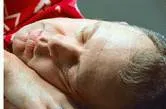Study found device may provide alternative to air mask therapy
WebMD News from HealthDay

By Dennis Thompson
HealthDay Reporter
WEDNESDAY, Jan. 8, 2014 (HealthDay News) -- A new kind of implant may offer people suffering from sleep apnea an alternative to wearing an air mask while they snooze, researchers report.
With the implant, a pacemaker delivers electrical impulses to a nerve that controls the tongue and maintains the muscle tone of a sleeping person's upper airway, according to a study published in the Jan. 9 issue of the New England Journal of Medicine.
These impulses reduced nightly sleep apnea events by about 68 percent, according to the results of the one-year clinical trial. The technology also decreased by 70 percent the number of times that a person's blood oxygen level dropped due to sleep apnea.
Not surprisingly, patients reported a 40 percent improvement in their ability to stay awake during the day, the researchers added.
Sleep apnea is a disorder in which a person's breathing pauses or grows shallow while they are asleep. The most common type is obstructive sleep apnea, in which the person's airway collapses or becomes blocked during sleep, according to the U.S. National Heart, Lung, and Blood Institute.
Left untreated, the condition disrupts sleep and causes a person to feel drowsy during the day. Long-term health consequences can include heart disease, insulin resistance and high cholesterol, said study author Dr. Patrick Strollo.
Doctors most often treat obstructive sleep apnea by asking patients to use a continuous positive airway pressure (CPAP) machine while they sleep, said Strollo, co-director of the Sleep Medicine Institute at the University of Pittsburgh and director of the university's Sleep Medicine Center.
With CPAP, patients wear a nose and mouth mask attached to an motor, and the mild air pressure maintained by the pump keeps their airway from collapsing -- much in the way that an air pump keeps an inflatable holiday lawn decoration from flopping over.
However, some patients can't sleep with the CPAP mask on or they find the air pressure uncomfortable, Strollo said.
"We always struggle in the field of sleep apnea to be able to effectively treat patients and present them with options," he said. "This represents a different option for patients that cannot tolerate CPAP."
In the clinical trial, 124 patients at 22 different hospitals in the United States and Europe were fitted with a pacemaker in their chest. The study was supported by the pacemaker's manufacturer, Inspire Medical Systems. The company also helped design the study alongside the researchers and regulators from the U.S. Food and Drug Administration.
With the device, an electrode runs from the pacemaker to the hypoglossal nerve located under the tongue. Another lead wire runs down to the muscles between the ribs of the chest and keeps track of the person's breathing.
source : Chest Implant Might Help With Hard-to-Treat Sleep Apnea








